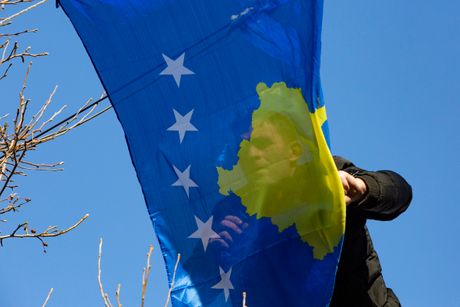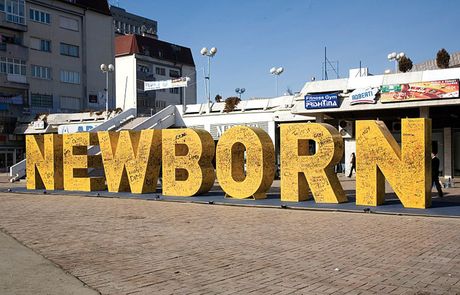13 years since Kosovo's self-proclaimed independence: Pristina without president, government and PM

At the session of the Assembly in Pristina, on February 17, 2008, unilateral independence of so-called Kosovo was declared by then prime minister of the provisional institutions of Pristina Hashim Thaci.
The declaration of independence, at the time approved by 109 members of the Assembly during a session not attended only by members of the Serb community, stated that "an independent Kosovo will be committed to peace and stability" and that a state would be formed on "the basis of Martti Ahtisaari's plan."
Today, 13 years later, so-called Kosovo is marking the anniversary without a president, prime minister or assembly president in a full mandate.
Hashim Thaci, who was until recently president of the provisional institutions of Pristina, is currently in The Hague, where he is on trial before the Specialist Chambers of Kosovo that deal with the acts committed while he was the commander of the so-called Kosovo Liberation Army (KLA). Besides him, in the Hague dock are also influential Pristina politicians and leaders of the so-called KLA: Kadri Veseli, Jakup Krasniqi and Rexhep Selimi.
The previous government, led by Prime Minister Avdullah Hoti, collapsed after a decision of the Constitutional Court which assessed that the government elected unlawfully because the mandate of one of the members of the Assembly who voted in favor was contentious.
With the fall of the government, the so-called Assembly of Kosovo was dissolved as well, so its President Vjosa Osmani is in a caretaker mandate.
Snap parliamentary elections were held on February 14, and Albin Kurti's Self-Determination, which lacks several seats to form a government on its own, won the most votes.
What happened on February 17, 2008?
At a ceremonial session held in Pristina on February 17, then prime minister of the provisional institutions Hashim Thaci declared independence and only a day later this was recognized by eight countries: Afghanistan, the US, France, Albania, Turkey, the UK, Australia and Senegal.
An emergency session was held as soon as on February 18 in Belgrade, when the Assembly of Serbia confirmed the Government's decision on annulment of illegal acts brought by the provisional self-government bodies in Kosovo and Metohija, regarding the declaration of unilateral independence. On the same day, an urgent withdrawal of Serbian ambassadors was ordered from those countries that had recognized Kosovo's independence.
At the session of the UN Security Council, which was convened at Serbia's request, the president at the time, Boris Tadic, asked the UN secretary-general to dissolve the Provisional Assembly of Kosovo, and to annul its decision on independence. UN Secretary General Ban Ki-moon, however, did not do that, but he stated at the session that UN Security Council Resolution 1244 remained the valid legal framework.
The Ministry of the Interior filed a criminal complaint against president and prime minister of so-called Kosovo, as well as president of the so-called Kosovo Assembly because they "organized a proclamation of a fake state in the territory of Serbia."
In June 2008, Kosovo received its anthem, and the new Kosovo Constitution entered into force.
At Serbia's request, the UN General Assembly adopted a resolution on October 8, 2008, asking the International Court of Justice (ICJ) in The Hague to answer the question: "Is the unilateral declaration of independence by the Provisional Institutions of Self-Government in Kosovo in line with international law."
That court ruled on July 22, 2010 that the unilateral declaration itself did not violate international law, Resolution 1244, or the international legal order in Kosovo.
How many countries have recognized Kosovo, 13 years later?
13 years after declaring independence, Kosovo has been recognized by about 100 countries. However, the exact number is not known.
Pristina quotes the number of 117 countries, while in Belgrade they say that there are far fewer of them.
Among the European Union countries that have not recognized Kosovo are Spain, Slovakia, Cyprus, Greece and Romania, and when it comes to world powers, these are Russia, China, Brazil and India.
The last recognition of Kosovo came from Israel, which established full diplomatic relations with Kosovo at the beginning of this year based on the Washington Agreement signed at the White House.
Kosovo has become a member of several international organizations since 2008, such as the IMF, the World Bank and FIFA, but not the United Nations.
How will Albanians mark the anniversary of the unilateral proclamation
In the past, this date was marked in Pristina with big celebrations, but this year there are no such events due to the coronavirus measures.
Top officials of the so-called Kosovo pay tribute to their wartime leaders, as well as to political leader Ibrahim Rugova.

The symbol of the declaration of independence in Pristina is the sculpture "Newborn" which gets a new color every year. The authors of the sculpture have decided that this year citizens themselves will paint it in military colors, using the palms of their hands.
(Telegraf.rs)
Video: Predstavlje novi film "Saučesnici"
Telegraf.rs zadržava sva prava nad sadržajem. Za preuzimanje sadržaja pogledajte uputstva na stranici Uslovi korišćenja.

